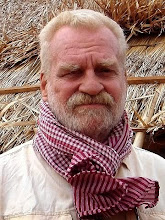President Barack Obama has given Prime Minister Hun Sen a road map for the way forward to even greater glory: release imprisoned broadcaster Mam Sonando, allow opposition politicians to function freely (e.g. allow Sam Rainsy to return to the Cambodian political arena) and establish an independent election commission.
Hun Sen can easily accomplish these goals with no danger to his political future. Indeed, by following President Obama's advice, he can assure his standing as a respected elder statesman.
It should be noted here that President Obama could have raised a number of really difficult cases such as impunity for murder and corruption involving some Cambodian officials. The fact that the president appears to have stressed relatively simple matters suggests he was making a serious proposal rather than throwing up an impenetrable barrier to improved relations.
Mam Sonando represents no political threat to the Prime Minister. Sonando is a respected public figure, but not a political force. He is best known as a popular independent broadcaster, a human rights activist and something of a social gadfly. He was arrested and convicted of "insurrection" in a bizarre case involving the government's mishandling of a land dispute in which a 14-year-old girl was killed by security forces. Sonando's involvement seems to have been his radio station's broadcast of issues surrounding the land dispute and may have been an awkward attempt to divert public attention from the killing.
Sam Rainsy, on the other hand, has been a political opponent of the Prime Minister for years, but he has little popularity with the vast majority of the electorate. He is an overseas Khmer (he holds French citizenship) and is most popular with Khmer abroad and with small pockets of urban voters and former Khmer Rouge who may be enthralled by his anti-Vietnamese rhetoric. His party currently holds only 26 seats in the 123-seat National Assembly. All opposition parties combined hold only 33 seats.
If Rainsy were to return to Cambodia to participate in next year's election, it is extremely unlikely his new combined opposition party - The Cambodia National Rescue Party - would fare much better than his previous escapades. Indeed, given Rainsy's autocratic leadership style - he does not play well with others - the new party may well implode if he is in the midst of the process. The new party has some formidable and highly regarded personalities, but if they have to function in Rainsy's shadow, their charisma will be greatly diluted. It should be noted that President Obama did not mention Sam Rainsy by name, but referred obliquely to the need for or opposition parties “to be able to operate.” President Obama was not indicating US support for any candidate, but for the democratic process.
In 2009, Rainsy was convicted of forgery and destruction of public property in an incident related to a dispute over the border demarcation between Cambodia and Viet-Nam. Some argue the charges were politically motivated, but the physical removal of border markers and the publication and circulation of maps at variance with national policy were also politically motivated and would certainly be a matter for legal action anywhere. Rainsy is now in self-imposed exile and faces a twelve-year prison sentence if he returns to Cambodia.
Prime Minister Hun Sen has the option of requesting Royal pardons for Mam Sonando and Sam Rainsy. Such pardons would certainly be seen as the gestures of a self-confident leader – and some would see them as strokes of political genius.
The issue of the composition of the election commission is somewhat more complicated, but certainly well within the capacity of the Prime Minister and his colleagues. As the Cambodian Peoples' Party will easily win nationwide in free and fair elections, why not demonstrate that? In democracies, elections are won by campaigning on the rights and legitimate aspirations of the people, not by rigging the process. President Obama is a perfect role model for that point.
It must be humiliating for Prime Minister Hun Sen, who was seeking a non-permanent seat for Cambodia on the UN Security Council, to now be seen as the odd man out in ASEAN – upstaged most recently by President Obama's nod to Burmese President Thein Sein for the ongoing reforms there. Hun Sen must also be concerned about the growing influence of China in Cambodia and President Obama has given him an easy way to demonstrate to the world Cambodia is not in China's pocket, but is a legitimate, developing democracy and independent nation open to improved relations with the U.S. as well as improved standing in ASEAN and the wider community of nations.
Bill Herod
Thursday, November 22, 2012
Subscribe to:
Post Comments (Atom)

Well written, and well said article Bill. Thanks.
ReplyDelete